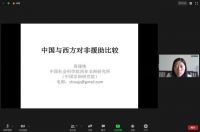
编者按
据英国《卫报》报道,森林消失体量最大的地区为热带拉丁美洲,然而毁林速度增长最快的地区则位于非洲。
如何在发展与环保中取得平衡,加强中国企业在非洲投资的可持续发展?中国发展简报英文编辑部(CDB)拜访了永续全球环境研究所海外投资、贸易与环境项目官员张经纬,了解到在非洲的中国投资者所面临的问题和风险,并通过研究和政策推动来倡导有利于各方的永续发展目标。
中国发展简报计划在2020年发布《中国NGO走出去地图》。作为这个项目的一部分,我们与本土公益组织进行了一系列访问,探讨中国公益组织的海外项目以及执行过程中所面对的挑战。如果您服务于中国本土公益组织并希望将相关项目信息标注到这个地图上,欢迎电邮联系我们 aurora.tin@cdb.org.cn 。
去年亚马逊森林大火引起全球关注,正当所有人担心地球之肺的存亡,在世界的另一端,随着非洲经济蓬发,这片原始大地上的广袤雨林正以惊人的速度消失。
据英国《卫报》报道,森林消失体量最大的地区为热带拉丁美洲,然而毁林速度增长最快的地区则位于非洲。非洲在2001年到2013年期间,年均森林消失面积少于两百万公顷,然而到了2014年到2018年之间,这个数字倍增至每年超过四百万公顷。
国际环境与发展研究所(International Institute for Environment and Development,IIED)指出,农业、林业、矿业以及基础建设在不同程度上影响非洲的森林。导致森林退化的原因当中,有高达33%来自伐木活动。
因为根据IIED发布的报告显示,非洲出口的木材中高达75%被送往中国。以莫桑比克为例,该国每年采伐三十万立方米木材,大约90%出口到中国。若干年前,来自中国的大企业就在非洲偏远的雨林工作,据估计,在接下来的十年内,中国企业在非洲的投资额将上升至超过一万亿美元,在各个签约和剪彩仪式背后,有赢家也会有输家。
永续全球环境研究所海外投资、贸易与环境项目官员张经纬表示,他们的工作是通过研究和政策推动,加强中国在非洲投资的可持续发展(图片:中国发展简报)
为了加强中国企业在非洲投资的可持续发展,以及提升多方对于木材贸易合法性和森林治理的认识,位于北京的永续全球环境研究所(GEI)邀请中国林业科学研究院林业科技信息研究所,加入了由IIED支持的中非森林资源管理合作项目。
双方信息流通及追溯待完善
永续全球环境研究所海外投资、贸易与环境项目官员张经纬表示,这个为期四年的项目是在IIED的一个大框架下于2014年开展,目标是了解在非洲的中国投资者所面临的问题和风险,并通过研究和政策推动来倡导有利于各方的永续发展目标。
“国际上有一些声音说中国可能是非法木材贸易的购买方,但并没有具体的数据来支撑这样的观点。所以我们做了一个对比研究,把中国从喀麦隆、乌干达、刚果(金)和莫桑比克这四个国家进口木材的海关数据,和当地国出口到中国的数据进行对比。”
张经纬分析,理论上若进出口都通过官方渠道,这两者的数据应该是一致的,然而在查找国际和当地海关数据库之后,GEI发现数据是存在差异的。“有些情况下中国的数据会比当地国多,这样的差距可能是由无证明文件的木材贸易造成的。这些木材贸易可能来自非法渠道,也可能是合法但缺乏妥善管理而导致的。”
张经纬进一步解释, 合法和非法砍伐的定义并不明确,不同国家的定义可能也不一样,进出口两国之间并没有达成共识。例如一些非洲国家可能会在某个时间段颁布出口禁令,任何木材出口都是非法的。然而这样的禁令并没有传达到目的地国,导致进口国海关在审查时只要文件完整,就会如常操作。
经过深入调查,GEI发现除了非法砍伐的定义不明确,许多非洲国家的海关流程和管理是不健全的,数据记录也是不完整的,“比如说在莫桑比克的口岸出口,很多情况下都是手动记录,没有电子化流程。当地的林业部门也没有这些数据,他们需要向该国的统计部门申请才能得到完整的数据。”张经纬说。
这些没有衔接上的碎片,促使GEI在2018年带着中国海关专家到非洲做技术交流,分享中国海关如何通过电子化流程加强各部门之间的信息流通和追溯。
GEI参访位于喀麦隆的木材企业(图片:GEI)
遏止非法砍伐靠中非合作
除了伐木,其他的土地利用活动也为中国企业、当地社区和环境带来风险,例如常涉及到人口迁移的基础建设投资。
“中国企业比较少跟当地的非盈利组织和社区沟通,他们通常会跟当地政府签署协议后就直接开始工作,缺乏处理受影响社区拆迁或情绪问题的经验。”张经纬说,GEI也尝试为这些企业提供建议,让企业更好地去处理相关问题,但更多思考的是如何推动新政策,以便国家能够从政策上去引导及规范中国企业的行为。
在项目执行期间,GEI成功与IIED和非洲合作方联合举办每年一度的中非森林治理平台会议,并支持5位中国记者赴非调查,在中外多家媒体发表关于中国在非洲林业投资等议题的调查报道。GEI也发布了两份中非森林治理研究报告,重点关注中国及非洲项目国的木材进出口法规。
随着中国在非洲林业所扮演的角色日益加强,张经纬认为GEI的工作对于促进双边合作起着重要的作用,在增进中非之间互相了解的过程中,达到遏止非法砍伐的最终目标。
中非记者参与由GEI主办的中非投资贸易媒体培训工作坊 (图片:GEI)
真正的挑战是与中国企业建立信任
作为一个中国公益组织在非洲展开工作,GEI的任务是充满挑战的。对张经纬而言,语言障碍以及政策的复杂性都是可以克服的,真正的挑战在于和中国企业建立信任关系,并且让他们做出改变。
“第一个挑战是我们作为公益组织的身份。中国许多企业和人并不了解NGO这个行业,加上之前国际上一些NGO会提出反对意见,导致一些中国企业会认为NGO整个行业是来反抗他们的。所以他们可能不理我们,有时候就算跟我们见面了,他们对我们的身份还是存疑的,会问我们是一个公司还是来自政府部门?也会问我们的资金是怎么来的。”
第二个挑战是企业内部的沟通协调机制。例如当中国企业对GEI提出的建议感兴趣时,对方有时也须要向上级甚至是位于中国的总部汇报,尤其是需要资金支持的社区项目。
话虽如此,既然中国是非洲林业贸易的最大市场,GEI作为一个中国公益组织,能够兼顾中国投资者和当地社区的利益,在有效解决非洲森林退化问题上具备更大的优势。
GEI相信提供有建设性的解决方法比一昧的谴责来得更为有效。“国际上对非法木材贸易这个课题的惯常做法是去发声以及提高国际社会的意识。可能从中国企业和中国人的角度来看, 这样的做法就像在指责中国,但并没有触及到实际解决问题这个部分。GEI扮演的角色是在这个课题上往前推进一步,通过建设性的方案来解决问题。当然,许多国际机构现在也开始往这个方向来做,而不只是发声或指责。”
张经纬说,随着非洲经济的崛起,世界也希望非洲会选择一个更永续的发展道路,避免中国和其他许多国家先前采用的“先污染,后治理”的旧模式。谈及如何在发展和环境保护之间取得平衡,张经纬说GEI的立场是理性的,倡导的是永续发展的经济模式,而非一昧破坏。她以林业作为例子,解释永续发展林业如何在不牺牲自然环境的情况下,为持续增长的非洲经济带来更高的附加价值。
“非法砍伐很多时候是原木出口,因为市场对原木有需求。或许给当地居民一点钱,他们就会把树砍了,然而售卖原木能为社区带来多少附加价值?在永续发展模式下,投资者除了利用森林资源,也会反馈回森林以及社区。比如说,如果他们在当地建立木材加工产业,整合自然资源进行深加工、做成产品买到国际市场,这对于当地人的生计、就业机会和经济都会有好处。”
这项与IIED的四年项目已经在2018年结束,但GEI在非洲的工作将持续下去。在新项目中,GEI将在五个非洲国家——喀麦隆、刚果布、加纳、利比里亚以及加蓬开展工作,持续关注中国在非洲的投资及其对非洲森林的影响。期许通过在政策层面推动改变并促进中非合作,达到保护非洲雨林的最终目标。
原题:Chinese NGOs Going Out: the Global Environmental Institute
来源:NGOnews
日期:2020年1月4日
3 Jan 2020 | Africa · China-Africa Relations · Environmental Protection · forestry and grassland · Governance · Government Relations · International Partnerships · Policy and Regulations
Next year, CDB plans to launch an interactive map of all the overseas projects carried out by Chinese NGOs. As part of this project, we are conducting a series of interviews with local NGOs, discussing their overseas projects and the challenges they face. If you work for one and would like your projects to be included in the map, please do not hesitate to contact us at aurora.tin@cdb.org.cn.
While the fires in the Amazon rainforest have caught international attention and made people worried that the Earth’s ‘lungs’ may soon be gone, the vast rainforests in another part of the world – Africa – are also vanishing at a threatening rate, as African economies grow alongside intensive investments from China.
As reported by the Guardian, the greatest forest losses by volume has occurred in tropical Latin America, but the greatest rate of increase in deforestation is taking place in Africa, where rates doubled from less than 2 million hectares a year on average from 2001 to 2013, to more than 4 million from 2014 to 2018. It is estimated that up to 30% of the Congo Basin, a large area of wilderness stretching across six countries containing 20% of the world’s tropical forests, will disappear by 2030.
The International Institute for Environment and Development (IIED), an environmental research institute, points out that agriculture, forestry, mining and infrastructure are the sectors that affect Africa’s forests, while logging is responsible for 33% of forest degradation.
China is often criticized for the loss of forests in Africa because, according to the IIED, 75% of Africa’s timber is exported to China. In Mozambique particularly, out of the 300,000 cubic meters of timber harvested every year, about 90% is exported to China.
Although the big Chinese companies were already working in the remote rainforests of Africa before the Belt and Road Initiative begun, the world’s largest infrastructure and trade project definitely gave these companies a boost. The investment of Chinese companies in Africa is predicted to rise to over USD1 trillion over the next decade. Behind the ribbon-cutting ceremonies, there are winners and losers. Many call for China to take a stronger role in overseeing its investors.
Zhang Jingwei, the program officer of Global Environmental Institute, says their work is to promote China’s sustainable investments and trade in Africa through research and policy facilitation (Photo: CDB)
To promote sustainable investment by Chinese enterprises in Africa and an awareness on issues of timber legality and governance, the Global Environmental Institute (永续全球环境研究所, GEI), a Beijing-based Chinese NGO, joined the Research Institute of Forestry Policy and Information (RIFPI) of the Chinese Academy of Forestry (CAF) for the IIED-led China-Africa Forest Governance Learning Project.
Zhang Jingwei, the program officer of the Overseas Investment, Trade and the Environment Division of GEI, says the four-year project started in 2014 under a larger framework led by IIED, aiming to understand the problems and risks faced by Chinese investors in Africa and promote sustainable development that will benefit all the stakeholders through research and policy facilitation.
“Internationally there were voices saying that China might be a buyer of illegal wood products, but there was no evidence to support this claim. GEI therefore conducted a comparative research, analyzing the discrepancies between the timber export data from Cameroon, Uganda, Congo (DRC) and Mozambique and the data on timber that China imported from these countries.”
Zhang adds that theoretically the export and import data should be the same, but the research results show that the records of Chinese imports is larger than the records from the African countries, indicating the possibility of an undocumented timber trade that may be illegal or legal but lacks proper management.
Zhang further explains that there is no clear definition of illegal logging commonly accepted by the exporting and importing countries, creating a grey area of which people can take advantage. African countries may sometimes impose a ban on log exports for a period of time, which means any logs exported are illegal. However such export bans are usually not communicated through to the countries of destination, and therefore the customs of these countries may process the imports in the usual way as long as the documents are complete.
After further digging, GEI revealed that not only is the definition of illegal logging unclear, but the customs operations in many African countries are also poorly managed and executed. For example, Zhang says, “the timber export data in Mozambique is often hand-written and the Forestry Department itself doesn’t keep the full data set. They would need to apply to the National Statistical Office to access the data.”
These disconnected pieces prompted GEI to bring several Chinese customs experts to Africa in 2018, sharing how the timber trade data could be better tracked through the digitalization of the customs process.
GEI visits a timber company in Cameroon (Picture: GEI)
Apart from logging, other land-use activities such as the building of infrastructure, which often involves development-induced relocation, also impose risks on Chinese companies, local communities and the environment.
Zhang says: “Chinese companies are known for communicating less with the local NGOs as well as the affected communities. Their common practice is to start the project straightaway after signing a contract with the government, oftentimes without properly handling the problems that the affected communities face.”
GEI tries to provide advice to these enterprises on how they can manage these issues better, and more importantly it pushes for policy change which ultimately could better regulate the code of practice of these companies.
During the project period, GEI successfully held annual learning platform events with IIED and African partners on forest governance, and supported five Chinese journalists to report on Chinese investments in Africa, resulting in published articles about challenges in Africa’s own timber legality and Chinese investment in timber and other related industries. GEI also published two reports on Africa’s timber governance, specifically focusing on export and import regulations in China and African project countries.
As China plays an increasingly significant role in African forestry, Zhang believes that GEI’s work is critical in pushing for bilateral collaboration, which will help improve the mutual understanding between African countries and China, and eventually put an end to illegal logging.
Chinese and African reporters participate in the Journalist Salon organized by GEI (Photo: GEI)
Addressing a global issue in Africa, GEI’s work is challenging. To Zhang, language barriers and the complexity of policy can be overcome, but the real challenge is to build a trusting relationship with the Chinese companies, and to make real changes to their operations.
“Firstly, Chinese companies are not very familiar with the NGO sector in China. The international NGOs that they dealt with might have given them a hard time, so when we approach them, they believe that we are also here to work against their operations. They might not agree to meet us, or even if they do, they have doubts about our identity and might ask if we are a company or if we are from the government. Some also ask where we get our funding.”
Secondly, Zhang points out that even when one or more people from a company are interested in the suggestions provided by GEI, they will need to seek permission from higher up in the company, even the HQ in China, especially when it comes to community projects that require financial support. Their internal coordination mechanisms could bring challenges to the program too.
On the other hand, since China is the biggest player in the African timber trade, GEI as a Chinese NGO has its advantages when it comes to tackling forest degradation in Africa. Working for the benefit of both Chinese investors and the local communities, GEI believes giving constructive solutions instead of condemning is what’s effective.
“On the issue of illegal logging, what the international community usually does is to speak out and raise awareness of this issue. However, to Chinese people or Chinese companies, such actions appear to be a condemnation instead of a solution. So instead of criticizing, we are doing our part by providing constructive solutions, which is also now a trend that many international NGOs are working towards.”
Zhang says that along with the rise of African economies, the world is hoping that African countries will embrace sustainable development and avoid the old development model of “pollute first, clean up later” that China and many other countries had to adopt.
Talking about the balance between development and environmental protection, Zhang claims that GEI’s standing point is rational. She then gives examples to show how sustainable forestry could bring a higher value to the growing African economies without taking a toll on the environment.
“In the illegal logging activities, forest products will be exported in the form of raw logs because that’s what the market demands. When local people are offered a small amount of money, they will cut the trees down. How much added value can the community get from selling raw logs? What we promote is a sustainable model where investors utilize forest resources but also consider contributing back to the forests and local communities. Imagine if they build a wood processing industry that turns their natural resources into products, the livelihood and employment opportunities and the economy will greatly benefit from it.”
The four-year project with IIED ended in 2018, but GEI’s work in Africa continues. The new project will take place in five countries – Cameroon, the Republic of the Congo, Ghana, Liberia and Gabon, focusing on Chinese investment and the impact on the forests in Africa. Through policy changes and improved collaboration between China and African countries, eventually Africa’s rainforest, home to an abundance of animal and plant life, will be well-preserved.
*免责声明:本站文章图文版权归原作者及原出处所有 ,文章内容为作者个人观点,并不代表本网站。如果您发现网站上有侵犯您的知识产权的作品,请与我们取得联系,我们会及时修改或删除。




